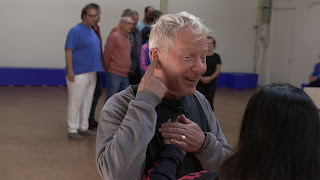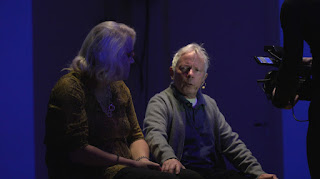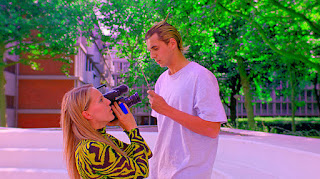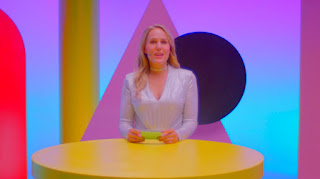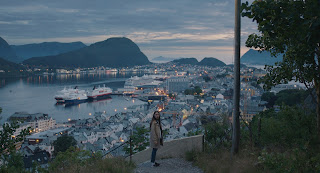
Monday, 31 January 2022
Altijd alles anders (Christiaan van Schermbeek, 2022)
When you hear the name Paul Röttger, there's a good chance that you might think of his starring role in the TV adaptation of Jan Terlouw's Oorlogswinter, a series that was first broadcast all the way back in 1975 on what was then known as Nederland 1 (now NPO 1). A few years later, Röttger was seen on the big screen in another tale of the Netherlands under German occupation, Wim Verstappen's Pastorale 1943. The part of Michiel van Beusekom in Oorlogswinter might quite reasonably be viewed as Röttger's defining screen role, although he also played the title character in Simon Winner and appeared in the Dutch version of classic British sitcom Porridge. Yet for the past three decades or so, Röttger has been more or less exclusively focused on theatre; his pioneering efforts with the Rotterdams Centrum voor Theater (RCTh) have rightly earned numerous plaudits for the actor–director, who also founded the institution.
What sets Röttger's work with the RCTh apart is that, at its core, it's all about inclusivity, and his company Theater Babel Rotterdam consists of performers from all walks of life—race, gender, sexuality, physical ability, or mental condition form no obstacle for those who'd like to work in one of Röttger's productions. There's no gimmick here—Röttger has complete belief in this project, and he has worked tirelessly to carve out a space for people who are shunned by so many; this fine film from Christiaan van Schermbeek captures the sincerity of a man who has devoted himself to providing opportunities for anyone and everyone who harbours the desire to work in theatre. Van Schermbeek is no stranger to the International Film Festival Rotterdam, where Altijd alles anders is currently premiering in the RTM strand, and over the past twenty years a number of his medium-length works—most notably the Simply Cinema series of films—have played at the festival.
While Altijd alles anders generally takes a holistic view of the work of Theater Babel Rotterdam, it does spend some time on individual interviews with a number of the company's members beyond Paul Röttger, and such segments frequently prove to be both illuminating and moving. One of the film's most touching moments comes fairly early on, when Stijn, a likeable young man with a real talent for drumming, rues the day when he came close to joining a band. The reasons it didn't work out had nothing to do with his musical ability, and Stijn says that he doesn't consider it to be a missed opportunity; rather, he views the way he is as being the real missed opportunity. There's something quite heartbreaking about the highly perceptive Stijn's candour, yet he's a great example of the sort of individual who, without the exceptional tutelage of Paul Röttger, would most likely have spent much if not all of their life on the margins of society.
As a documentary, Altijd alles anders is something of a no-frills affair, with van Schermbeek opting for a pragmatic approach as he gets up close and personal with both Röttger and the actors he's guiding; it's fascinating to watch the company's rehearsals from the vantage point of a camera that's quite literally among the actors, and such a bold move captures both the immediacy and energy of the group in a way that could never be matched by the fly on the wall technique. What if any difference this strategy might make to the performers is impossible to gauge, but you sense that van Schermbeek is just as well to jump right in like this; after all, as the great ethnographic filmmaker Jean Rouch once pointed out, subjects will always be affected by the presence of a camera. In a way, Christiaan van Scheermbeek's approach mirrors that of Röttger's: both men are keen to roll up their sleeves and cut directly to the heart of the matter. Altijd alles anders is both a fine record of Paul Röttger's work with RCTh and a deceptively simple film; it contains moments that stay with the viewer for a long time after the end credits have rolled.
Darren Arnold
Images: IFFR
Labels:
IFFR,
NL,
Oorlogswinter,
RTM
Friday, 28 January 2022
Met mes (Sam de Jong, 2022)
Back in 2015, Sam de Jong made quite a splash with his debut feature Prins; four years later, he moved into English language cinema with New York story Goldie. Although de Jong's irreverent take on Dumas' De drie musketiers—a TV movie shot in a mere ten days in German-speaking Belgium—premiered on NPO 3 just last month, his third and latest theatrical feature, the Dutch language Met mes, has already been unveiled. Marrying an eye-popping colour scheme with inventive sound design, de Jong's new film successfully navigates several tonal shifts before arriving at its conclusion, and it is to the writer–director's credit that proceedings never become too predictable. With any luck and the right marketing, Met mes should find an audience beyond those who encounter it at the 51st International Film Festival Rotterdam, where it's currently screening.
Met mes focuses mainly on two characters: Eveline (Hadewych Minis) is a television presenter who has just quit her job in order to make a hard-hitting documentary exploring various social issues, and it is while shooting this that she crosses paths with teenager Yousef (Shahine El-Hamus), who acts as a distraction so his friend can steal Eveline's expensive VHS camera. When her insurance company refuses to pay out on the grounds that the crime hasn't been reported, Eveline goes to the police station; there, she proceeds to give a statement, and as Yousef was the only one of the thieves that she actually saw, she describes the young man as best she can, but embellishes her story—as per the film's title—to include the detail that she was threatened at knifepoint. Naturally, the mention of such a weapon sees the matter escalated, and the police soon track down Yousef who, while not exactly innocent, certainly isn't guilty of a crime of this nature.
Amidst all the garish visuals and witty sight gags (the one involving the police officer who takes Eveline's statement is a real standout), de Jong hands his audience an interesting dilemma: while we're presented with a victim and a perpetrator, the hard truth is that both of these characters are in the wrong—so who should we side with? Despite his ill-judged involvement in the theft of the camera, Yousef comes across as a reasonably steady character, although the same description could equally apply to Eveline if we overlook her dishonesty when it came to filing the police report; neither Eveline nor Yousef are the worst people one might encounter, yet the viewer is forced to constantly reevaluate the pair's actions (and their consequences) as the situation grows more serious.
Curiously, Met mes recalls another IFFR 2022 title in the form of Bruno Dumont's France; each film sees a famous TV personality—one who is quite happy to manipulate real events to make for "better" television—begin to unravel in the wake of an unfortunate encounter with a young man of north African heritage. Just as France's eponymous news anchor eventually seems to lose her bearings as far as the line between verity and fabrication is concerned, Met mes' Eveline attempts to absorb Yousef's crime and its aftermath into the documentary she was making when her camera was stolen. But no matter what is going on at any given point in Met mes, Sam de Jong's audacity and energy go a long way towards sweeping the audience along for what proves to be a highly entertaining diversion, one that displays a fine sense of the absurd.
Darren Arnold
Images: IFFR
Labels:
Bruno Dumont,
IFFR,
NL
Wednesday, 26 January 2022
A Human Position (Anders Emblem, 2022)
As with his 2018 debut feature Hurry Slowly, A Human Position—currently screening at the International Film Festival Rotterdam—sees director Anders Emblem firmly on home territory in the western Norwegian town of Ålesund; in a further parallel with Hurry Slowly, A Human Position's leading role is played by Amalie Ibsen Jensen. The excellent Jensen brings a haunted quality to the troubled Asta, a young journalist working for an Ålesund newspaper, for which she reports on matters including football, proposed redevelopment, and the various cruise ships lined up in the town's expansive port. Asta performs well in her job, one which appears to serve as a welcome distraction from some darker issues lurking around the edges of the reporter's life; in one scene at the home she shares with upholsterer/budding musician Live (Maria Agwumaro) and an incredibly cute cat, Asta is shown applying some sort of cream to her stomach before she turns in for the night.
While most of the stories covered by Asta leave little in the way of a lasting impression on the young woman, things change when she stumbles across the sorry tale of Aslan, an asylum seeker who once worked in the town but has since vanished; word is that Aslan has been deported, but Asta senses that there's something more to the story. As she digs deeper into the mystery, Asta encounters much in the way of red tape, and she speaks to several town officials, all of whom seem to have mastered the art of talking a lot while saying nothing. Yet the passive aggressiveness that meets these enquiries does little to deter Asta, who doggedly sticks to piecing together Aslan's movements in the time leading up to his disappearance. As with Antonioni's L'Avventura, there's a nagging feeling that this puzzle is one bound to remain unsolved.
While A Human Position feels far from didactic—Emblem largely invites the viewer to interpret the film however they like—it implies that Aslan's fate is the fault of both everyone and no one. As such, it recalls Michael Haneke's The White Ribbon, a film that cast a cold, unblinking eye over the notion of collective responsibility (or lack of it). The wealth and stability of Norway stand in sharp contrast with the circumstances that the unseen Aslan sought asylum from (and has purportedly been returned to). It is to the film's great credit that we get a real sense of the missing man, and just as Asta seems to make a tangible connection to him via the chair favoured by Aslan during his work breaks, the viewer is able to form a picture of this notable absentee (his choice of seat highlights an obvious motif in A Human Position, given that Asta and Live's home is scattered with chairs in various states of repair). Asta, unlike many others in her hometown, has opted to be interested in Aslan's story, and this same choice is extended to the viewer.
Darren Arnold
Images: Alibi Communications
Labels:
IFFR
Tuesday, 11 January 2022
Looking for Muriel
I'm very grateful to each and every person who buys my books, so should you choose to order Looking for Muriel: A Journey Through and Around the Alain Resnais Film, please know that your purchase is greatly appreciated. The book is available directly from the publisher, as well as from a number of retailers, including Walmart, Amazon and Google, the last two of which are linked to at the very bottom of the page (to find these buttons, be sure to use the desktop version of the site and scroll all the way down). If you'd like to check if the book is available from your country's Amazon, simply visit that particular store and plug the following number into the search box:
Saturday, 1 January 2022
Subscribe to:
Posts (Atom)

